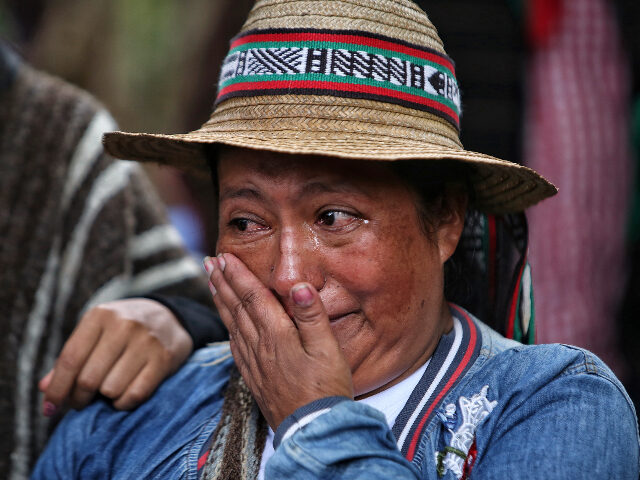The Ombudsman’s Office of Colombia warned on Thursday that the government had reason to believe a wing of the Marxist Revolutionary Armed Forces of Colombia (FARC) terrorist organization had turned an entire town in the nation’s west into a recruitment and training center for child soldiers.
The Ombudsman’s Office (defensoría del pueblo, or literally “public defender’s office”), is tasked with addressing human rights violations on a federal level in Colombia. Ombudsman Carlos Camargo Asís accused a FARC subgroup on Thursday of seizing the town of Toribío, in the western region of Cauca, and using it to recruit children.
The FARC, a communist terror group that has plagued Colombia for over half a century, has a long history of child abuse, including the recruitment of child soldiers, torturing children, raping girls, and forcing the girls to endure dangerous jungle abortions if they become pregnant after being raped by senior terrorists.
Under former President Juan Manuel Santos, Colombia embarked upon a “peace process” in which it cut a deal with the group that granted its leadership uncontested seats in Congress and perks including minimal punishment for their crimes and little oversight as to their finances, fueled largely by cocaine cultivation and trafficking. The Colombian people rejected the agreement in a national referendum in 2016, but Santos rammed the deal through Congress unconstitutionally shortly thereafter, garnering him the Nobel Peace Prize that year.
To maintain the illusion that the FARC deal resulted in the dissolution of the group, the Colombian government refers to active FARC terrorists as “dissidents,” as opposed to the Congressmen and other FARC elites who benefitted from the agreement and are treated as the only authentic voice in the group.
The peace deal did little to stop FARC activity, particularly in more remote areas of the country. Current President Gustavo Petro – a hard-left leader with former ties to another communist guerrilla, the M-19 – campaigned on the promise of implementing a “total peace” plan that would use legal amnesty for guerrilla-related crimes and other incentives to encourage active terrorists to lay down their weapons.
Camargo, the ombudsman, revealed on Thursday that the Petro government had reason to believe that the population of Toribío, Cauca had essentially been taken hostage by a wing of FARC “dissidents” known as the “Dagoberto Ramos Mobile Column.”
Under the FARC, he explained, the town had become a “center for military and financial operations” and a “welcome center” for abducted children, where they were forced into “brief training” before being shipped off to engage in terrorist activity elsewhere in the country.
Camargo said the situation is a threat to all civilians in the area, “but especially the boys, girls, adolescents, and youth who are facing more danger before the interest of the illegal armed group in forcibly recruiting them.”
“They offer some instructions, training school-style, to later send them to areas where they are finally deployed,” the ombudsman explained.
The children in training sessions were, he said, likely from northern Cauca. Children in the town, and all residents, also faced extreme danger, he continued.
“If people are not exactly confined, the development of social and community life is not just paralyzed, but subject to the will of armed groups, as they impose multiple norms and the death penalty for anyone who does not obey them,” Camargo explained. “For example, public establishments are banned from selling alcoholic beverages on weekdays, motorcycles are not allowed to park in front of storefronts, and they are mandated a closing time, among other restrictions.”
Toribío’s population of over 37,000 people is about 96 percent indigenous Americans.
The Dagoberto Ramos wing of the FARC is believed to be heavily active in marijuana trafficking, using the town to maintain access to a pivotal trafficking route for the drug.
While the ombudsman’s office is actively pursuing cases of FARC human rights abuses, the Petro administration has been primarily preoccupied with offering legal forgiveness to top terrorists as part of its “total peace” campaign. This week, Petro’s government controversially suggested lifting the arrest warrants of multiple communist terrorists – both FARC and members of other communist guerrillas – most prominently Javier Alonso Velosa García, better known as Jhon Mechas, accused of an assassination attempt against Petro’s predecessor Iván Duque in 2021. Petro is also seeking peace talk with the National Liberation Army (ELN), the largest communist terror group in the country aside from the FARC, and other smaller organized criminal enterprises.
Petro objected vocally this week to plans in El Salvador to handle organized crime by simply capturing and imprisoning violent criminals. El Salvador’s president, Nayib Bukele, debuted a “mega prison” for suspected gang members this week, believed to be capable of housing as many as 40,000 inmates.
“The terrible photos – I can’t go into other countries – of the concentration camp in El Salvador, full of thousands and thousands of young people imprisoned, it makes one shudder,” Petro said in remarks this week. “I think there are people who undoubtedly like that, to see the youth in jails and believe that this is security, popularity soars. Undoubtedly, we also experienced this in Colombia.”
Petro claimed that Colombia “achieved the same” decline in homicide rates as El Salvador without imprisoning criminals, a claim Bukele mocked.

COMMENTS
Please let us know if you're having issues with commenting.